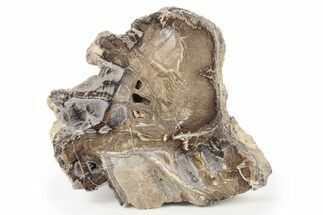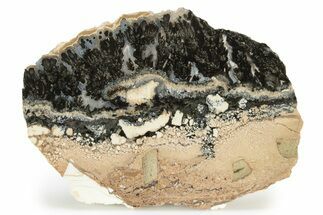This Specimen has been sold.
Exceptional, 8.6" Polished Slab of Blue Mountain Jasper - Oregon
This is an exceptionally beautiful, 8.6" wide slab of Blue Mountain picture jasper that has been polished to a glossy finish on one side.
It comes with an acrylic display stand.
It comes with an acrylic display stand.
About Blue Mountain Jasper
Blue Mountain picture jasper is arguably one of the most astonishing varieties of jasper across the globe. This spectacular jasper is collected in the Blue Mountains of southern Oregon. You can recognize a specimen of Blue Mountain picture jasper by its dark, blue-black core, often bordered by beige and green bands. However, its most noticeable feature is the inclusion of olive, tan, and blue orbs floating throughout. This variety is a favorite of lapidarists and is often cut into cabochons for jewelry.
Blue Mountain picture jasper is arguably one of the most astonishing varieties of jasper across the globe. This spectacular jasper is collected in the Blue Mountains of southern Oregon. You can recognize a specimen of Blue Mountain picture jasper by its dark, blue-black core, often bordered by beige and green bands. However, its most noticeable feature is the inclusion of olive, tan, and blue orbs floating throughout. This variety is a favorite of lapidarists and is often cut into cabochons for jewelry.
About Jasper
Jasper is a term that can be applied to an opaque variety of chalcedony. The opaqueness is due to a higher concentration of impurities mixed with silica/quartz compared to other varieties of silica, such as quartz or agates. Like agate it may form in a wide variety of colors, and is often multi-colored. In most cases, jasper forms when silica-rich fluids permeate throughout a soft sediment or volcanic debris deposit. The fluids then crystallize around the particles/impurities, resulting in a cementation process. Most often, the impurities present determine the coloration of the deposit following solidification, but other factors can play a role in the color of what is now considered a jasper.
Jasper is a term that can be applied to an opaque variety of chalcedony. The opaqueness is due to a higher concentration of impurities mixed with silica/quartz compared to other varieties of silica, such as quartz or agates. Like agate it may form in a wide variety of colors, and is often multi-colored. In most cases, jasper forms when silica-rich fluids permeate throughout a soft sediment or volcanic debris deposit. The fluids then crystallize around the particles/impurities, resulting in a cementation process. Most often, the impurities present determine the coloration of the deposit following solidification, but other factors can play a role in the color of what is now considered a jasper.
SPECIES
Chalcedony var. Jasper
LOCATION
Near McDermitt, Oregon
SIZE
8.6 x 4.6", .3" thick
CATEGORY
SUB CATEGORY
ITEM
#302898
 Reviews
Reviews













